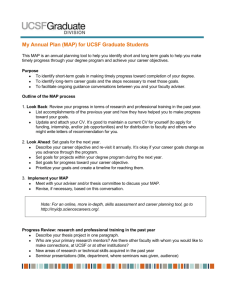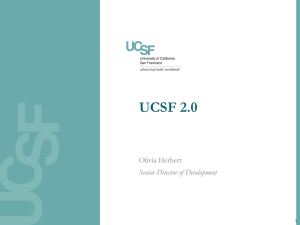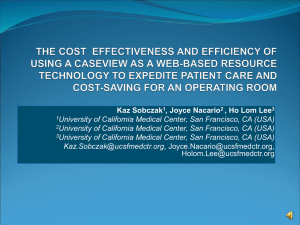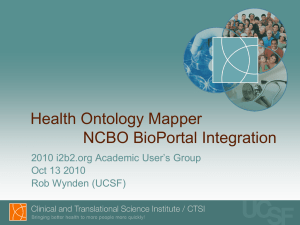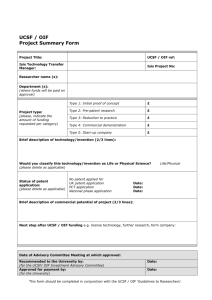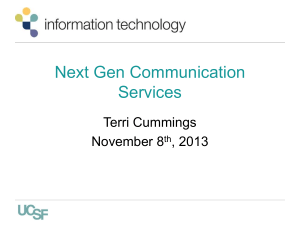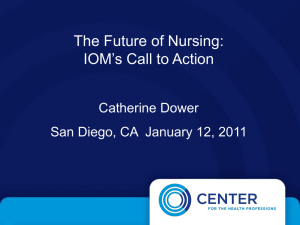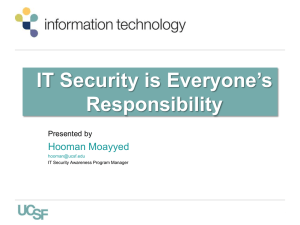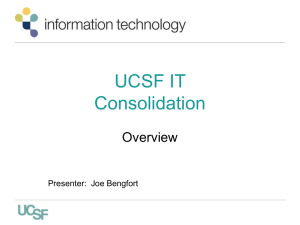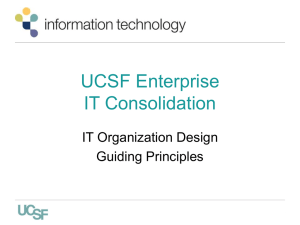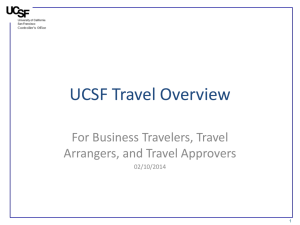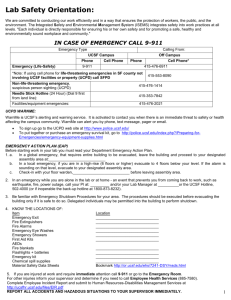Previous Cancer Center SRA is looking for Bay Area positions this
advertisement
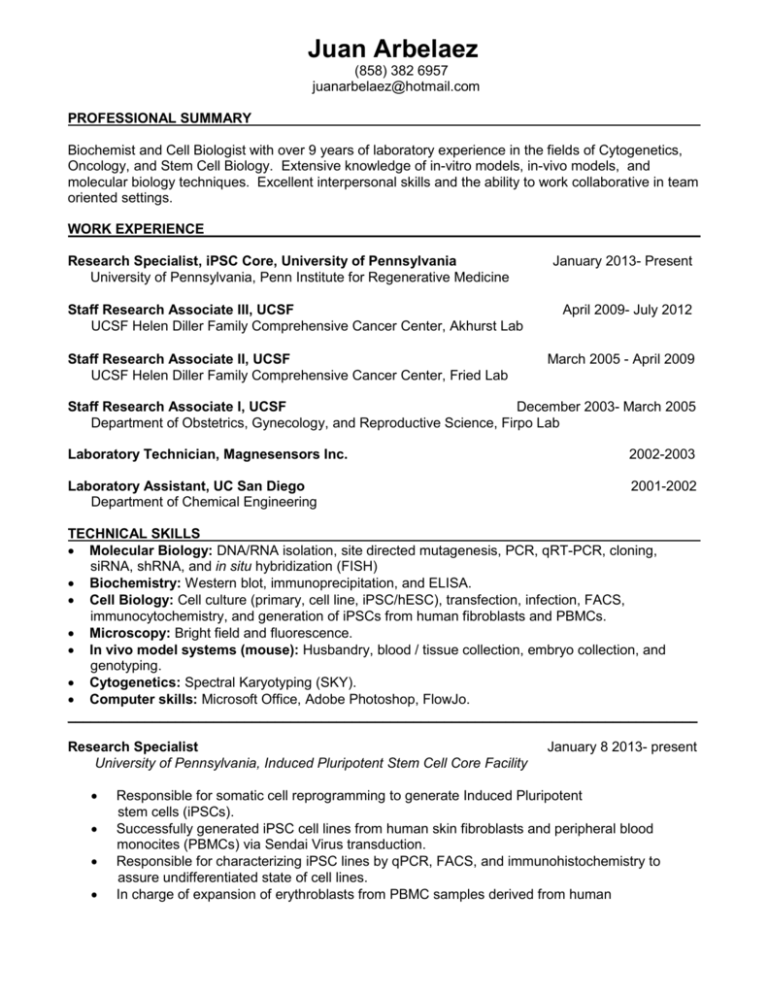
Juan Arbelaez (858) 382 6957 juanarbelaez@hotmail.com PROFESSIONAL SUMMARY Biochemist and Cell Biologist with over 9 years of laboratory experience in the fields of Cytogenetics, Oncology, and Stem Cell Biology. Extensive knowledge of in-vitro models, in-vivo models, and molecular biology techniques. Excellent interpersonal skills and the ability to work collaborative in team oriented settings. WORK EXPERIENCE Research Specialist, iPSC Core, University of Pennsylvania University of Pennsylvania, Penn Institute for Regenerative Medicine Staff Research Associate III, UCSF UCSF Helen Diller Family Comprehensive Cancer Center, Akhurst Lab Staff Research Associate II, UCSF UCSF Helen Diller Family Comprehensive Cancer Center, Fried Lab January 2013- Present April 2009- July 2012 March 2005 - April 2009 Staff Research Associate I, UCSF December 2003- March 2005 Department of Obstetrics, Gynecology, and Reproductive Science, Firpo Lab Laboratory Technician, Magnesensors Inc. 2002-2003 Laboratory Assistant, UC San Diego Department of Chemical Engineering 2001-2002 TECHNICAL SKILLS Molecular Biology: DNA/RNA isolation, site directed mutagenesis, PCR, qRT-PCR, cloning, siRNA, shRNA, and in situ hybridization (FISH) Biochemistry: Western blot, immunoprecipitation, and ELISA. Cell Biology: Cell culture (primary, cell line, iPSC/hESC), transfection, infection, FACS, immunocytochemistry, and generation of iPSCs from human fibroblasts and PBMCs. Microscopy: Bright field and fluorescence. In vivo model systems (mouse): Husbandry, blood / tissue collection, embryo collection, and genotyping. Cytogenetics: Spectral Karyotyping (SKY). Computer skills: Microsoft Office, Adobe Photoshop, FlowJo. __________________________________________________________________________________ Research Specialist University of Pennsylvania, Induced Pluripotent Stem Cell Core Facility January 8 2013- present Responsible for somatic cell reprogramming to generate Induced Pluripotent stem cells (iPSCs). Successfully generated iPSC cell lines from human skin fibroblasts and peripheral blood monocites (PBMCs) via Sendai Virus transduction. Responsible for characterizing iPSC lines by qPCR, FACS, and immunohistochemistry to assure undifferentiated state of cell lines. In charge of expansion of erythroblasts from PBMC samples derived from human blood. Responsible for culturing and banking iPSCs. Took a lead role in the derivation of iPSCs as a service offered by the core. Trained core service users in iPSC tissue culture. Responsible for isolation and banking of PBMCs from patient blood samples. In charge of laboratory equipment maintenance. Staff Research Associate III, UCSF UCSF Helen Diller Family Comprehensive Cancer Center, Akhurst lab Worked as part of a team researching the effects of genetic background on angiogenesis and tumor formation. Responsible for optimizing siRNA transfections for gene silencing on human endothelial cells. Responsible for designing and generating shRNA constructs. Responsible for RNA isolation and qrtPCR quantification of mRNA knockdown levels. Optimized WESTERN BLOT protocols for assaying effect of siRNA transfections at the protein level. Trained incoming lab members on tissue culture techniques and molecular biology methods. Responsible for preparing mouse embryonic fibroblast cultures to be used in experiments. Responsible for mouse colony maintenance and genotyping. Responsible for mouse test-crosses to pinpoint chromosomal regions theorized of modifying the TGFβ signaling pathway. Responsible for preparing and presenting results in lab meetings. Served as Akhurst Lab manager. Staff Research Associate II, UCSF UCSF Helen Diller Family Comprehensive Cancer Center, Fried Lab April 2009- July 2012 March 2005 – April 2009 Results generated through applied biochemistry methods led to successful grant renewal. Use of computer software for DNA sequence analysis. Perform tissue culture and cryopreservation of mammalian cell lines. Perform western blots for protein expression analysis. Responsible for running Tandem Affinity Purification protocol. Use of immunofluorescence methods to identify cellular localization of proteins. Use of Microsoft excel and PowerPoint for presenting data. Perform Immunoprecipitation protocols. Developed excellent knowledge of molecular cloning strategies. Staff Research Associate I, UCSF December 2003- March 2005 Department of Obstetrics, Gynecology, and Reproductive Science, Firpo Lab Responsible for chromosomal analysis of Human Embryonic Stem (HES) cell lines. Took the initiative to be in charge of entire process of characterizing HES cell lines, from tissue. culture and cryopreservation to data analysis and presentation. Optimized the lab’s FISH protocols for successful chromosomal analysis of HES cell lines. Achieved high success rate in generating karyotype data as needed by specified deadlines via spectral karyotyping (SKY). In charge of training participants in embryonic stem cell tissue culture training program at UCSF. Used recombinant DNA technology for genetic manipulation of HES cell lines for research purposes. Responsible for maintaining accurate records of all procedures and results. Laboratory Technician, Magnesensors Inc. July 2002- July2003 Worked on a development stage project aiming to produce a commercial method for detecting bio-molecules labeled with magnetic particles. Performed control ELISA assay targeting IL-6 protein for comparison with prototype assay. Performed ELISA assay using anti-IL-6 antibodies conjugated to magnetic particles. Followed up magnetic particle ELISA by detection and data gathering using prototype superconductor system to detect magnetic charge of particles remaining in samples. Maintained laboratory notebook. Ordered necessary reagents for experiments. Discussed, reported, and presented observations to coworkers on regular basis. Laboratory Assistant, UC San Diego lab Department of Chemical Engineering, Chau Lab 2001-2002 Responsible for tissue culture of immortalized human cells. Optimized protocol for staining cytoplasmic proteins. Successfully performed cytoplasmic protein staining via immunochemistry. Successfully performed FISH (fluorescent in situ hybridization) assay for DNA intracellular staining. Maintained laboratory notebook. Ordered necessary reagents for experiments. Discussed, reported, and presented observations to coworkers on regular basis. ADMINISTRATIVE SKILLS Responsible for keeping accurate records of mouse colony in lab database. Assured lab’s compliance with mouse experimental protocols. Assured lab’s compliance with safety regulations and with the office of environmental health and safety at UCSF. Maintained charts of LN2 tanks and inventory of reagents. Coordinated material and information exchange with members of other laboratories. Coordinated the set up of animal experiments. Maintenance of laboratory equipment and supplies. PUBLICATIONS Benzinou, M., Clermont, F. F., Letteboer, T. G., Kim, H.J., Espejel, S., Harradine, K. A., Arbelaez, J., Luu, M. T., Roy, R., Quigley, D., Higgins, M.N., Zaid, M., Aouizerat, B., Ploos van Amstel, J. K. , Giraud, S. , DupuisGirod, S., Lesca, G., Plauchu, H., Hughes, C.C., Westermann, C.J.J. and Akhurst, R.J. (2011) Mouse and human strategies identify PTPN14 as a modifier of angiogenesis and Hereditary Hemorrhagic Telangiectasia. (2012) Nature Communications 3: 616, 1-9. (Featured Article of the week). EDUCATION University of California, San Diego BS Biochemistry and Cell Biology Minor: Political Science San Diego, CA December 2002 SFSU Courses: BIOL 763 - Molecular Biology of Cancer, BIOL 765 - Biomedical Immunology Advanced Topics REFERENCES Dr. Michael Fried (now in the UK): mfried@cc.ucsf.edu (44 is the area code for The United Kingdom). 44-0207-4851474 Dr. Rosemary Akhurst: rakhurst@cc.ucsf.edu (415) 514-0215. Dr. Silvia Espejel: espejels@cc.ucsf.edu (415) 205 6748.
